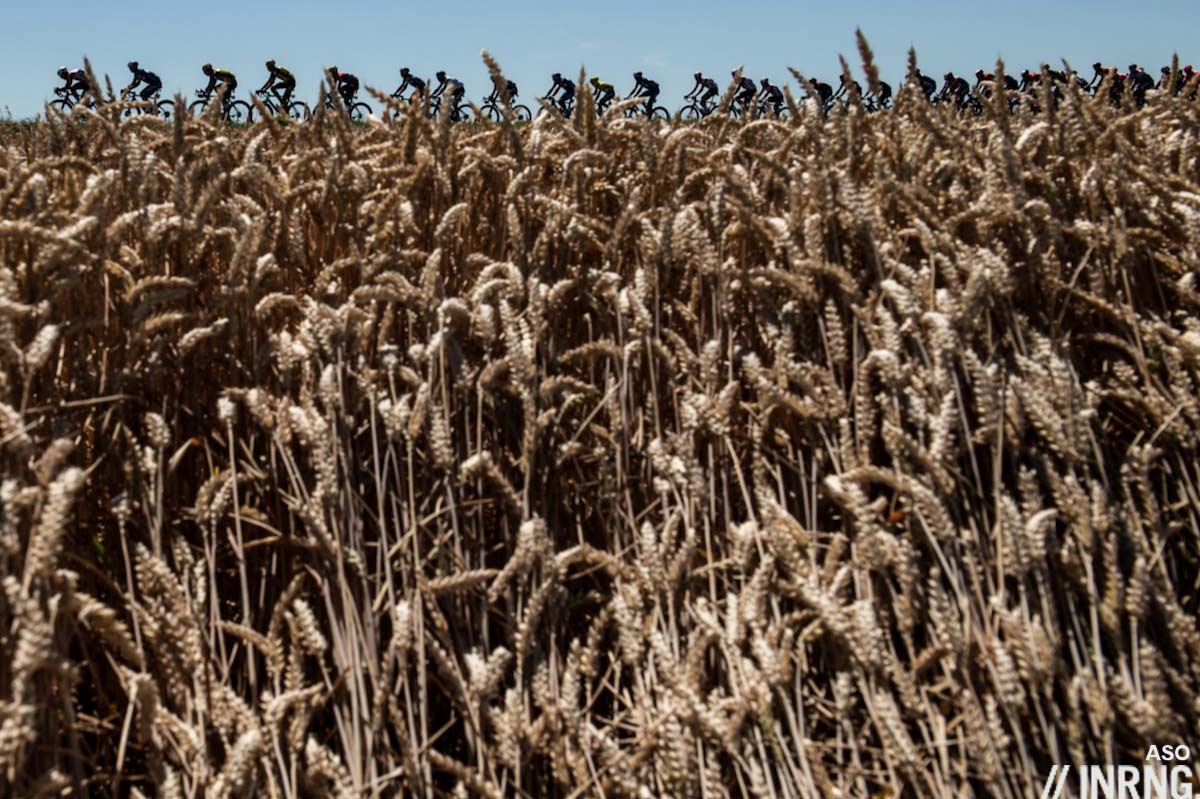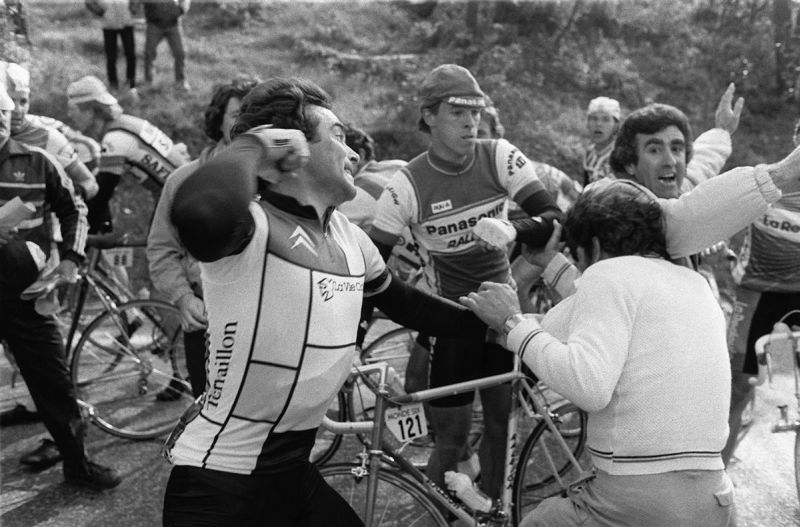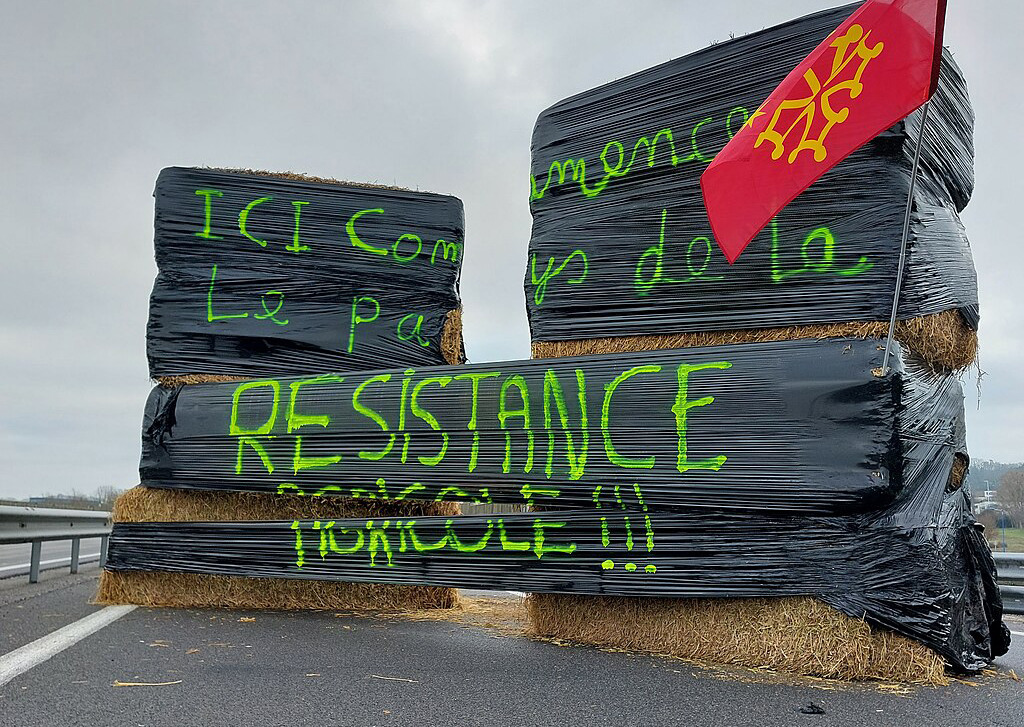The Etoile de Bessèges opening stage is cancelled because of protests by farmers. As it happens the race and the farmers’ union were in contact to make sure the the race would be ok. Alas the stage is off because of the knock-on effects of protests elsewhere.
Farmer protests began south-western France in a gentle way with town signs turned upside down, something Toms Skuijnš and Mads Pedersen spotted late last year. This has spread nationally and in recent days turned into bigger things like road blockades. French farmers protesting might not be news but these are bigger than usual with fishing involved too; and other European countries have seen protests too. We might see more disruption this season.
Getting back to cycling and the farmers were even ready to take part in the race, lining the route with tractors so that more people could see their protest thanks to TV according to local newspaper Le Midi Libre. But blockades on the nearby A9 autoroute mean other roads are saturated with extra traffic which in turn makes closing the race route harder and also complicates things for emergency services. Among all the rules and regulations for holding a bike race in France – and there are beaucoup – are often plans to ensure emergency vehicles aren’t blocked; typically don’t route a stage close to a hospital in case an ambulance needs to reach the hospital when the peloton is passing. Similarly venturing near a major highway brings added complications in case this is artery because of an accident or roadworks and the race route ends up being needed to absorb the detoured vehicles, often a tricky issue. This is just what has happened today. Plus the gendarmes needed to accompany the race and help with security are busy elsewhere, a big factor as well.

The decision to cancel the race was made by the local préfet, an appointed representative of central government, who asked the race to stop. So they had no choice but plan to resume tomorrow as the remaining four stages are further away from the protest zones.

Farmers and cycling normally have a tradition of working together, you will remember the field art from the Tour de France, this is a coordinated advertising campaign by the FNSEA farmer’s union who pick a theme for each year and even send the GPS coordinates to France Télévisions so that the producers can direct helicopters to film them. Later in the year Christian Prudhomme often gives out a prize for the best art. So normally these are two rural activities that coexist rather than clash.
Protests and cycling go together too in France and beyond. The sport takes place outdoors and if every road junction can be staffed by police, all the bits in between cannot be policed and so it’s easy for a few people to stop the race and get on TV. Typically this has been managed. Take the Tour de France and the CGT trade union, often one of the most militant and behind worker protests, has a presence in the publicity caravan: it works with the race. There’s been an implicit convention that protesters can threaten the race but not actually block it and in return the TV cameras will film banners and so on. We’ve seen this in Belgium too, nobody wants to stop a bike race but they will use it because it gets a good audience. That’s been a tradition but protests have stopped other races – think the Worlds last August – although only for minutes rather than cancellation for the day.

That’s also the Tour de France and maybe the Flemish classics as exceptions, attracting more protests because of a bigger audience but also with more police and political support to ensure the race goes on. In recent years we’ve seen préfets as literal spoilsports, with several orders to halt bike races. It was too hot in 2022 for the Route d’Occitanie so the official said non to a stage of the bike race, although the actual race could have gone ahead but the emergency services were too busy helping the frail struggling with the conditions, fair enough but if the Tour was in town it probably would have happened. Even Paris-Roubaix has been moved to October because a préfet ordered it. But the Tour de France probably benefits from such political capital that it’s near-unstoppable, the last time was 1982 when metal workers in Denain halted Stage 5, a time trial. Smaller races don’t have the same clout. Loyal readers will remember the story of when strikers tried to halt Paris-Nice and the story of that photo above, you can read the full thing here but the racing happened.
Conclusion
One of the charms of road racing is how races cross landscapes and visit new places. It’s a means to explore local culture and more, although this usually means scenery and cuisine more than protests that have knock-on effects on road traffic and the supply of moto gendarmes.
Hopefully all that’s missed is a day’s racing, riders can still get a ride done but the organisers hardly get a day off as they’ve got services to deliver and bills to pay, yet their “product” has been shrunk by 20%. According to L’Equipe today the race has a budget of about a million Euros but nobody gets rich off it, it’s a question of whether the race can survive shocks like this. Meanwhile there’s still bike racing to watch on a Wednesday, the Volta Valenciana starts today and Al Ula Tour goes on uninterrupted. Because if anyone dared to protest there…


Brave Bernard attacks the smallest man he could find at the protest. The guy must be all of 1.5m.
1.7M is what Wikipedia claims for Hinault, but I’ve stood next to him a time or two and he’s shorter than this for sure. I know because I’m 1.7M. But no matter how tall or short, I wouldn’t mess with The Badger! The old size of the dog vs size of the fight in the dog….
I have some sympathy for the farmers, they’re protesting here in Sicily too. But some of their gripes are about environmental rules which perhaps they should get help to comply with rather than be allowed to flout?
“Because if anyone dared to protest there…” ha ha ha!
It was not long ago when the farmers protesting and the peloton got tear gased at the Tour … so plus ca change.
“organisers hardly get a day off as they’ve got services to deliver and bills to pay, yet their “product” has been shrunk by 20%”
Unrelated to protests, but an interesting point to consider regarding the Tour of Britain, where I see that the organisers (Sweetspot Sports) are being sued by the Isle of Wight, for £250k costs incurred when the 2022 race was cancelled part way through due to the death of the Queen.
The merits of stopping sporting events due to the Queen’s death can be debated of course, but it’s hard not to feel sorry for Sweetspot here, and it highlights the tightrope on which some bike races exist with Sweetspot now in liquidation and the Tour of Britain in danger of ceasing to exist.
It is worth mentioning that the Tour of Britain was not cut short directly by the Queen’s death, but because the associated security operations took away the police resources needed to run the race.
Hopefully the lawsuit collapses, because it would be a dangerous precedent to set (this is English law we’re talking about, precedents matter) for an event organiser to be held liable for police decisions.
Sports played in dedicated venues were able to choose for themselves. Football was suspended for the whole weekend, but cricket waited one day and then started the final Test in the England v South Africa series in London one hour after the proclamation of King Charles.
All the same, the last three stages were cancelled by a decision made by the Tour of Britain organisation (and not by any other deciding body, be it local, regional or national).
“This decision has been taken in consultation with stakeholders and partners in light of operational circumstances, including the understandable reassignment of police resource at this time.”
Now, whether it could be seen as a force majeure situation, that is a legal question which quite probably must be decided by the court.
It would perhaps have been better for British Cycling to step up and take the responsibility?
British Cycling also told all its members they shouldn’t even go for a bike ride during the Queen’s funeral. They eventually came to their senses and apologised but to me it showed the leadership was (is?) out of step.
I think there could be another rant post on how badly British Cycling is run and how the bonanza of cycling from Olympics and Tour wins was wasted considering current racing calendar in the UK
It is force majeure because authorities are the major forces.
There were other underlying problems at Sweetspot, hence why the Tour Series fell by the wayside and the Women’s Tour was cancelled last year.
The lawsuit from the Isle of Wight may have been the straw that broke the camel’s back, but the company’s debts are considerably more than that £250k.
It’s ironic that you need to be rich enough to buy a tractor in order to successfully demonstrate against your poverty
Tractors are surprisingly expensive. I’d imagine farmers who can pay cash and buy new probably aren’t blocking the roads though, it’s more likely to be those who’ve had to take out loans to buy used models.
Got to chime in with the other comments here.
A tractor is a basic, required tool to do the job. The farmer either has to save up the previous profits to buy a new one – when required – or get a loan. If the farmer does not, he (or she, but more he’s than she’s) will go out of business and have no more livelihood. Indeed, they probably require *at least* 2 – a backup just in case, and for secondary tasks. Certain tasks on the farm are extremely time sensitive, esp in arable farming, and it would be a disaster to have to wait for a vendor to come and fix a broken tractor and not get the task done.
Modern farming is now very capital intensive. That does not make the farmer rich in terms of annual income. An small-scale farmer might well have €10m+ in assets in their land, buildings, and equipment, and (who knows) maybe €1m+ in input costs and annualised capital expenditure, just to generate an /average/ income for their family to live on. And they’re working damn hard for that average income.
Yes of course.
It’s just I think we should be careful to not over-romanticise it: from Magna Carta to the French Revolution, when traced back to their roots these protests are basically powerful elites flexing their muscles against other elites.
(and I suspect that if a Cleaner’s Union tried to protest with their mopheads the outcome would be different.)
It’s not a case of being rich enough to buy a tractor, if you can’t run one you may as well get out of farming. It’s not a luxury item!
And only an eejit who knows nothing about farming would think otherwise.
An anonymous eejit at that.
Apparently there is a farmer suicide every two days in France. Between the over the top regulations and the over the top enforcement it seems of little significance whether or not a bike race goes ahead.